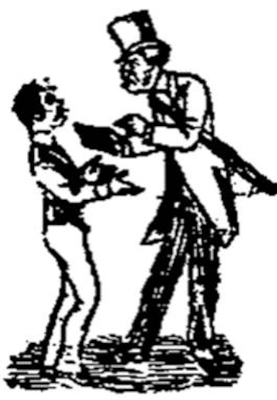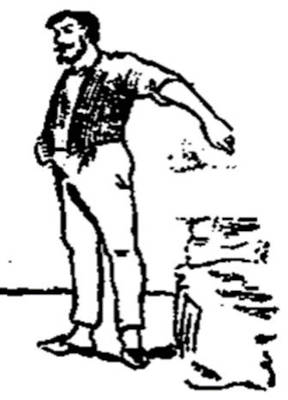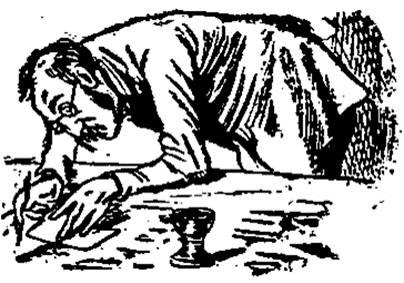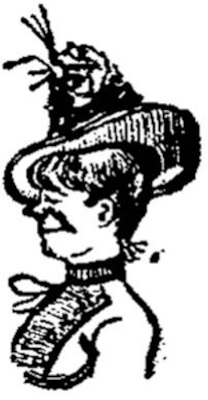This article has been transcribed from a copy of the Cardiff Times in the online collection of scanned Welsh newspapers 1804-1919 in the National Library of Wales, with grateful recognition of the free access accorded to all readers. Paragraph breaks have been introduced for easier reading.
There is little in this article which requires comment. As so often, Samuel complains about fashions in dress. Today’s readers will not be familiar with the process – almost a ritual – of the carving of the Sunday roast. It was often the prerogative of the head of the family, or might be a filial duty in homage to the father, or again part of the ceremony of coming of age. There is a comic description of just such an occasion in Anthony Trollope’s Doctor Thorne (1858) , when Frank Gresham (later to become a well-respected Member of Parliament) struggles to get through the ordeal at his twenty-first birthday party. Historically-minded Victorians liked to remember that the dutiful ('servysable') Squire in Chaucer’s Canterbury Tales was accustomed to carve before his father ('carf biforn his fader at the table'). —David Skilton

Is there not art in keeping a youth of this kind quiet? Rather!
PERSONALLY venture to think that there is art in the strictest sense, sir, in the doing of almost anything, however simple that thing may be, in my view. There is art required in jumping on or off a 'bus; there is art in falling gracefully when you come a cropper in the jumping off part of the bus-iness; there is art in swallowing a twopenny-pie luncheon at a buffet and looking as though you really enjoyed it and were taking it as a matter of preference; there is infinite art in borrowing stray half-crowns, and never refused [sic]; there is a whole concentration of art in being able to refuse them without offending the would-be borrower; there is art, when you are hard up and in that undesirable district not marked in the Postal Directories, but usually known as 'Queer-street,' in splashing your boots effectively with one dab of mud just where the ugly crack is; there is consummate art in meeting an implacable creditor and making it appear as though you were really rather glad than otherwise to see him – there is art in a lot of small things, and certain of these arts, about which I would speak, I was never through the lack of some quality the nature of which I know not, or for want of assiduity in the way of practice, able to acquire.

The little gentleman has not acquired the art of meeting an irate creditor with firmness.
Take as an instance the lighting of a match in the open air. That is one of the things, sir, that I never could compass under about two dozen matches, a violent attack of rage, and fingers burned in several places. To ask a man for a match, and only to receive one, or we will say three or four, is in my case a rank absurdity, likely only to end in vexation of spirit to me. With agitated and envious feelings do I watch other men, in a gale of wind almost, with the utmost ease, and with a delicate manipulative skill calling for the highest commendation, strike them on the seats of their pants, on their teeth, on their noses, or the metal work of their pipes, on their unshaven cheeks – strike them anywhere almost, and get a light, too. Do what I will I cannot accomplish this, despite long practice, and a feeling that I am on my merits and hate to be beaten. I may retire to the most sheltered corner, where there is apparently a total absence of breeze – I may take the nicest precautions in my endeavour to protect with my hands the flickering flame (when I manage to get a flame at all, that is), still am I usually unsuccessful at the finish. I either break the match, or its head comes off, or, just when I have managed to get something like a blaze, I drop my cigarette, or I put the wrong end of the cigar in my mouth, or I cannot get my pipe into the space left between my hands without letting in the wind and letting out the flame. Very tantalising it is when one is a couple of miles or so from anywhere to come to one's last match, and to know full well that one is incapable, except by the happiest of flukes, of utilising it effectually. The man who can strike a match on the top of a 'bus in a high wind commands, believe me, sir, a strong feeling of respect on my part, however much I may detest him for displaying a facility which I am afraid I shall never be able to gain.

This individual has not taken off his coat and rolled up his sleeves to indulge in fisticuffs – he is merely going to carve his Sunday dinner.
It is the same with the art of shaving sir, which’ when due skill is acquired, I think I might doubt the ‘real’ contemplative man's recreation. To many a busy man the period when he is shaving himself is one that he can give up to earnest thought and self-communion, and as such did old-time business and professional men (who never felt the hurry of existence as we do now) regard it. But fewer men nowadays can I shave themselves than could even 25 years ago. Our fathers were for the most part a clean-shaven lot and shaved over a goodly expanse of cheek, lip and chin; they felt for the most part that there was a certain degree of ingenuity and uncleanliness in having their noses pulled and their heads manipulated by a boy with dubiously clean hands and a man with a doubtfully firm wrist, who had evidently and only too palpably been indulging in a morning dram. They shaved closely with their own hands, and in the process thought closely with their own minds. But how many really effective shavers are there amongst the young men of to-day? Nowadays, we may occasionally attempt to shave such portions of our faces as we allow to remain unadorned, but the attempt generally culminates in reducing the room in which the effort is made into something resembling the operating room of an infirmary. We rush off to the shop of a much be-scented barber who affects to reserve unto one a 'special' pot and brush, and we submit to be bored by his conversation, to listen to his platitudes, and to be scraped over in the most elaborate fashion. Whether it is that your Samuel is a late sitter, and that his hand is not always as true and firm as it might be, he knows not, but certain it is that he is a most ineffective shaver, save perhaps from a cutting point of view; in fact, he might be described as a 'slashing' shaver. Yes, sir, it generally takes me double the time to repair damages that I may expend in the act of shaving and damaging myself. The more I 'strop' my razor, after my method, the blunter it seems to get, and the finding up of the necessary materials for scraping myself is a most elaborate and time-consuming process. Sometimes one of my hopeful sons seems to have been trying to cut a model boat out of a piece of wood (the latter with several complicated nails in it) with my razor, and at other times the only lather I can manage to raise is a purely mental one. Of a truth, shaving is to me a forbidden art, and one in the acquisition of I which I have expended far, far too much language unfit for publication.

An impecunious gentleman practising the art of begging letter-writing to a rich relative.
Then, sir, there is the art of carving. No doubt dinners [à] la Russe are in a great measure accountable for the dearth of carvers in these days, and the personal habit of never trying to learn any art which is unremunerative, and which can only cause trouble and a certain amount of work to the master of it, accounts for much more. It is one young married man in a 100 who can carve well in these days — possibly the other 99 may find some difficulty in getting hold of anything to carve. Anyhow, few young men can carve. They either let their wives do it for them, or they saw away haphazard, and imperfectly accomplish by brute force that which ought to be successfully done by means of anatomical knowledge and delicate handling. If they manage to be-spatter a friend's shirt front with gravy, they are but little concerned; for this is an indifferent, and certainly an indifferently polite, age or if half a fowl shoots into the lap of a lady with a new frock on, they are only concerned in a limited degree, that is, unless they have expectations from the lady – or she is their wife, when the affair, to use a polite euphemism, wears a very different complexion indeed.

A young person who does not understand the art of wearing her clothes gracefully.
Besides such minor acts as those I have referred to, there are many, many others. For instance, there is the art of keeping sober; of shaking hands with a man you know to be a treacherous sneak and a worm; of saying what you do not think; of eating a tough sandwich with anything like grace; of bearing too candid criticism with a smile that is neither strained nor sickly; of dropping unexpectedly upon a man you would not face for any amount, and yet affecting to be delighted to meet him; of passing round the collecting bag at church without showing any signs of fear lest you should drop it; of going through a quadrille when you feel that your suspenders have given way; of – well, of knowing when to stop when you have said enough.
Last modified 15 March 2022